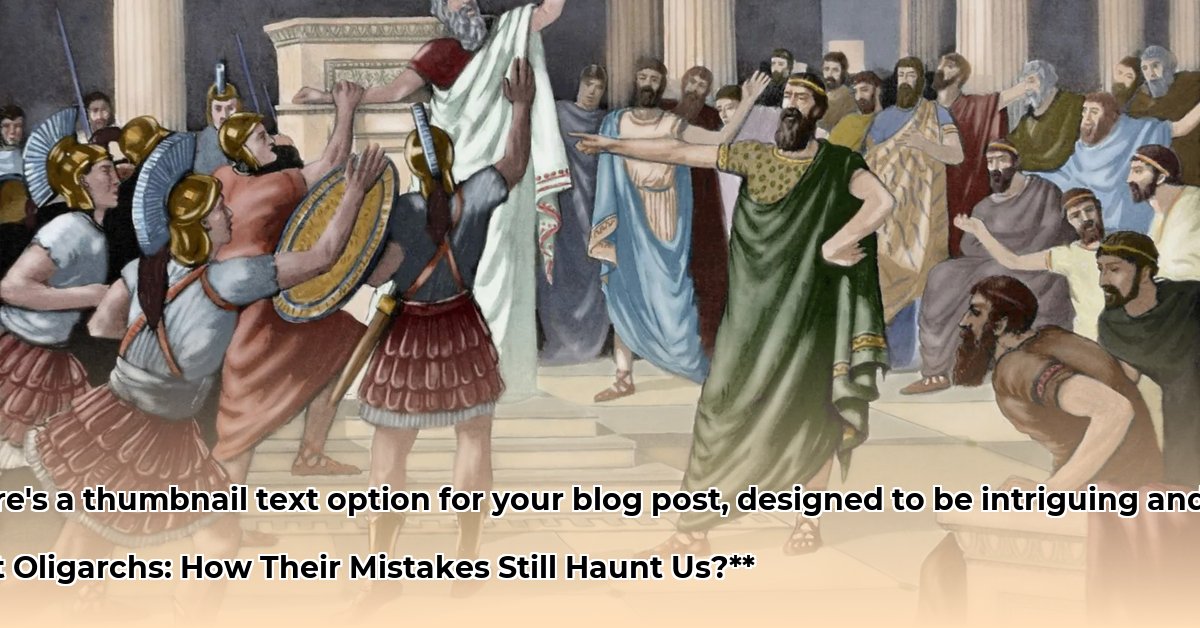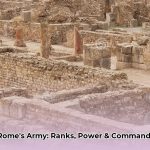Ancient Greece, often lauded as the birthplace of democracy, was in fact a vibrant crucible of diverse political experiments. Among the most prevalent of these was oligarchy, a system where power was concentrated in the hands of a select few. Derived from the Greek words “oligos” (few) and “archein” (to rule), ancient Greek oligarchies saw influential citizens—typically the wealthy, aristocratic families, or military leaders—wielding significant authority, dictating policy, and controlling state resources. This form of governance was a critical counterpoint to both the burgeoning democratic ideals seen in Athens and the often-volatile rule of tyrants. You can explore other forms of leadership, like monarchy in Greece.
But how effective were these “rule by a few” systems, and what can their rise, implementation, and eventual decline teach us about the delicate balance between stability, fairness, and distributed authority? Examining the complexities of oligarchy in ancient Greece offers invaluable historical insights that resonate deeply with contemporary discussions surrounding governance and power.
The Diverse Manifestations of Ancient Greek Oligarchies
The concept of oligarchy in ancient Greece was far from monolithic; its implementation varied dramatically across different city-states. While Athens notably progressed towards a more inclusive democratic model from its earlier oligarchic roots, other prominent centers like Sparta, Corinth, and Thebes embraced enduring oligarchic principles, each developing unique characteristics and structures reflecting their specific societal priorities and historical trajectories. These systems often emerged as perceived alternatives to the perceived instability of early democratic experiments or the oppressive nature of tyrannical individual rule, aiming to centralize decision-making for greater efficiency and to protect the interests of the elite.
Structural Nuances Across Key City-States
The structural nuances of ancient Greek governance under oligarchic rule were striking. Sparta, for instance, operated under a complex, mixed constitution that skillfully blended monarchical elements (represented by its two hereditary kings) with strong oligarchic components. At the heart of Spartan oligarchy was the Gerousia, a council composed of 28 elders, all men over 60 years of age, elected for life. This powerful body held significant legislative and judicial authority, advising the kings, initiating legislation, and serving as the supreme court. Alongside the Gerousia, the annually elected Ephors, five officials chosen from the citizen body, served as powerful overseers of both the kings and the Gerousia, possessing significant political and judicial authority, even capable of impeaching kings. While a citizen assembly, the Apella, existed, its influence remained considerably less than that of the Gerousia and Ephors, primarily serving to ratify decisions rather than initiate them. This intricate Spartan model, renowned for its military prowess and long-term stability, inherently led to significant social inequality, with general citizens having limited direct political participation.
Other city-states, like Corinth and Thebes, also experienced periods of oligarchic rule, often controlled by wealthy aristocratic families or groups of powerful merchants. These oligarchies highlight the adaptability of the system; some were more inclusive, allowing a broader segment of wealthy or noble citizens to participate, while others were highly exclusive, restricting power to a very small, tightly knit elite. This flexibility enabled them to respond to both internal pressures and external threats, sometimes incorporating elements of democracy or monarchic rule to maintain stability. However, the core principle remained consistent: the vast majority of the population was excluded from true political influence and decision-making.
Aristotle’s Philosophical Classification of Oligarchies
The eminent philosopher Aristotle, through his profound and systematic study of political systems in ancient Greece, delved deeply into the nuances and inherent dynamics of oligarchy. In his work Politics, he identified four primary types of oligarchy, categorized by their property qualifications and the degree of power concentration, shedding crucial light on the varying degrees of social and economic inequality they fostered.
| Type of Oligarchy | Description & Characteristics | Key Implications |
|---|---|---|
| I. Limited Franchise | This is the mildest form, where the property qualification for participation is relatively low, allowing a larger, albeit still limited, segment of the citizenry (those with moderate wealth) to participate. The rule of law tends to prevail, as the numerical superiority of this broader group of property owners prevents any single individual or tiny clique from dominating completely. Decisions are typically made according to established legal frameworks rather than arbitrary whims. | Offers a semblance of broader participation among the propertied class, leading to greater stability through adherence to laws. It’s less prone to outright tyranny but still excludes the majority. |
| II. Restricted Franchise | In this type, the property qualifications become significantly higher, leading to a smaller ruling class. While still bound by laws, these laws are often crafted to explicitly serve the interests of the wealthy elite. The rulers are fewer in number and possess greater individual wealth, allowing them to exert more direct control over policies. However, they may still feel a need to operate within a legal framework to maintain their legitimacy and prevent widespread revolt. | Power is further concentrated, leading to policies that overtly favor the ruling economic class. Laws become instruments to legitimize and protect the wealth and status of the few. |
| III. Dynastic Oligarchy | This form is characterized by extremely high property qualifications, resulting in a very small number of rulers, often from a few powerful, entrenched families. A critical element introduced here is hereditary succession, where privileges and political power are passed down through specific lineages and legally enforced. The ruling class now feels strong enough to formalize their control across generations, effectively treating the state as a family estate. The law, while still existing, becomes more of a decorative facade, easily manipulated for the benefit of the ruling few. | Represents a significant step towards authoritarianism, as hereditary rights solidify the power of a select group. The law’s authority diminishes as it becomes a tool for perpetuating dynastic control, increasing the risk of popular discontent. |
| IV. Extreme Oligarchy | The most stringent and oppressive type, where power is concentrated in the hands of an exceedingly small number of individuals who are not bound by law (or who outright disregard it). Their power is maintained through immense wealth, a network of loyal supporters, and often military force. This type closely approaches tyranny, as decisions become entirely arbitrary and self-serving, reflecting the personal desires of the rulers rather than any legal or societal framework. The concept of oligarchy itself begins to dissolve as individual will replaces collective rule. | This represents the most unstable and tyrannical form of oligarchy, where the rule of law collapses in favor of arbitrary power. It often leads to widespread oppression, corruption, and inevitably, fierce resistance and violent overthrow by the populace seeking redress for their grievances. |
Aristotle’s classifications highlight a critical point: the more extreme the oligarchy, the greater its inherent instability. When laws became subservient to the whims of the elite, it eroded public trust and often paved the way for tyranny or other forms of government that promised to restore order or equity.
Perceived Advantages and Inherent Disadvantages
A primary perceived benefit of oligarchy in ancient Greece was its potential for political stability and efficiency. The concentration of power in the hands of experienced, often educated, individuals was believed to foster consistent and predictable rule, averting the perceived chaos, lengthy debates, and shifting opinions associated with widespread public participation. Decisions, theoretically, could be made swiftly and decisively without the need for protracted public discussions or extensive consultation. Furthermore, rulers were often selected for their perceived skills, wisdom, or military prowess, which could lead to more competent governance in specific areas.
However, the downsides were profound and often proved fatal to these systems. The fundamental lack of representation and the systematic exclusion of the majority from political participation inevitably fueled widespread discontent and social division. Abuses of power were a constant and pervasive risk; concentrated authority significantly increased the likelihood of corruption, self-serving policies, and the implementation of laws that exclusively benefited the ruling class at the expense of the general populace. This systemic exclusion and the resultant economic disparities frequently triggered popular resistance, civil unrest, and even outright revolts. The historical shift in Athens from an early oligarchy in ancient Greece (like the rule of archons from aristocratic families) to a flourishing democracy in the 5th century BC vividly illustrates how popular dissatisfaction could dismantle entrenched oligarchic rule, underscoring the dangers of unchecked authority and the critical importance of broad political participation for long-term societal well-being.
The Decline and Fall of Ancient Greek Oligarchies
The ultimate downfall of oligarchy in ancient Greece was seldom due to a single, isolated factor. Instead, it was typically a confluence of internal strife, mounting external pressures, and, most critically, widespread popular discontent among the disenfranchised majority. The exclusionary nature of these power structures created inherent vulnerabilities that, over time, often proved unsustainable.
Systemic Challenges Leading to Collapse
Internal power struggles frequently plagued oligarchic regimes. Factions within the ruling elite often vied intensely for influence, wealth, and control, undermining the very stability and efficiency they sought to uphold. This internal discord diverted crucial resources and attention from effective governance towards endless, destructive conflicts among the ruling class, weakening the state from within. While Sparta’s blended system achieved remarkable military success and persisted longer than many in other city-states, its rigid social structure and narrow ruling class still faced internal challenges from discontented non-citizens and perioikoi.
External pressures, such as inter-city-state wars, foreign interventions from empires like Persia or Macedonia, and intense economic competition, also severely strained oligarchies. These challenges exposed their inherent vulnerabilities, sometimes forcing the ruling elite to make significant concessions to the populace or leading to their outright collapse in the face of overwhelming opposition. Yet, the most potent and consistent catalyst for decline was undoubtedly popular dissatisfaction. The general populace grew increasingly resentful of the concentration of power, wealth, and privilege among an exclusive few, particularly when these benefits came at the cost of their own economic stability or civic rights. This simmering resentment often fueled powerful movements for democratic reform, culminating in the violent overthrow of oligarchic regimes and the establishment of more inclusive systems. A stark example is the brutal rule of the Thirty Tyrants in Athens, a Spartan-imposed oligarchy following the Peloponnesian War. Their extreme cruelty and disregard for law quickly led to a popular uprising that successfully restored democracy, forcefully demonstrating how ancient Greek governance truly failed when it systematically alienated the majority. Ultimately, their inability to adequately address the needs and aspirations of the majority proved to be their undoing.
| Factor | Description | Impact |
|---|---|---|
| Internal Power Struggles | Constant vying for influence, wealth, and control among competing factions within the ruling elite. This could manifest as rivalries between aristocratic families or different economic interest groups. | Systematically undermined regime stability, diverting resources and focus from effective governance towards internal conflicts and betrayals. This disunity often made the oligarchy vulnerable to external threats or internal uprisings. |
| External Pressures | Wars with rival city-states, invasions from larger empires (e.g., Persia, Macedon), and intense economic competition for trade routes and resources. | Strained state resources, weakened the oligarchy’s military and economic capacity, and exposed vulnerabilities to internal dissent. Such pressures sometimes forced oligarchs to make concessions or even led to their complete overthrow by victorious external powers or by their own populace seeking new leadership. |
| Popular Discontent | Widespread and growing dissatisfaction among the majority of the populace due to their exclusion from political participation, economic disparities, and perceived abuses of power by the ruling elite. This often manifested as resentment over taxation, food shortages, or unfair legal treatment. | Fueled powerful movements for democratic reform or even outright revolution, often culminating in the violent overthrow of oligarchic regimes. This deep-seated dissatisfaction highlighted the inherent fragility of systems that do not genuinely address the needs and aspirations of all their citizens, leading to a demand for more inclusive governance. |
Actionable Lessons from Ancient Oligarchies for Today
The study of ancient Greek oligarchies offers profound historical insights into the ongoing complexities of governance in any era. Their rise and precipitous fall provide critical lessons, especially regarding the inherent dangers of unchecked power, the necessity of inclusive governance, and the cyclical nature of political systems.
Key Takeaways for Modern Political Thought
- Oligarchies in ancient Greece emerged as powerful, albeit often short-lived, alternatives to tyranny or nascent democracy, seeking stability and efficiency but invariably at the cost of broad social equality and civic participation.
- Their structures varied significantly across diverse city-states, ranging from more moderate, law-bound systems to extreme, arbitrary rule by a few entrenched families, reflecting a wide spectrum of administrative models.
- Internal power struggles, persistent external pressures, and, predominantly, widespread public dissatisfaction were consistent and powerful drivers of their decline and ultimate collapse.
- The enduring legacy of these ancient systems emphasizes the vital need for balanced power distribution, robust accountability mechanisms, and genuinely inclusive political frameworks to ensure long-term societal health and stability.
Countering Modern Oligarchic Tendencies
In contemporary societies, the concentration of wealth and influence—often termed “wealth concentration” or “elite capture”—raises valid and pressing concerns about potential undue influence on political processes. Are we witnessing a subtle, insidious shift towards new forms of oligarchy, where economic power translates directly into disproportionate political control, bypassing traditional democratic mechanisms? Combating these tendencies requires a multi-pronged approach involving various stakeholders.
- For Citizens and Activists: Actively engage in understanding the dynamics of wealth and power concentration and its societal impact. Support and advocate for policies that promote economic fairness, such as progressive taxation, robust social safety nets, and equitable access to education and healthcare. Participate in civic life, from local elections to broader social movements, to ensure that diverse voices are heard and represented.
- For Policymakers and Legislators: Implement and enforce strong antitrust laws to prevent corporate monopolies and the aggregation of disproportionate economic power. Increase transparency in campaign finance and lobbying activities to limit the undue influence of money in politics. Safeguard and actively expand voting rights, and ensure equitable access to media and information to foster informed and truly representative public discourse.
- For Media and Journalists: Maintain a vigilant and critical stance in investigating and reporting on the influence of private wealth and corporate power in political decision-making. Champion diverse perspectives and provide platforms for marginalized voices, consistently challenging superficial narratives that might obscure underlying power imbalances and holding powerful entities accountable.
By internalizing these profound lessons from the past, particularly the cyclical nature of political systems and the inherent dangers of concentrated power, we can work collectively towards building more equitable, just, and truly representative societies. True and lasting stability stems not from excluding voices or centralizing authority, but from genuinely embracing broad political participation and ensuring that power is distributed widely for the benefit of all citizens.
- Unearth ancient rome achievements: Engineering feats & legal legacies, examined - August 13, 2025
- Unlock ancient rome army ranks: Power, impact & legion command - August 13, 2025
- Conquer Your Exam: Ancient Greece Quiz Ace It Now! - August 13, 2025
















